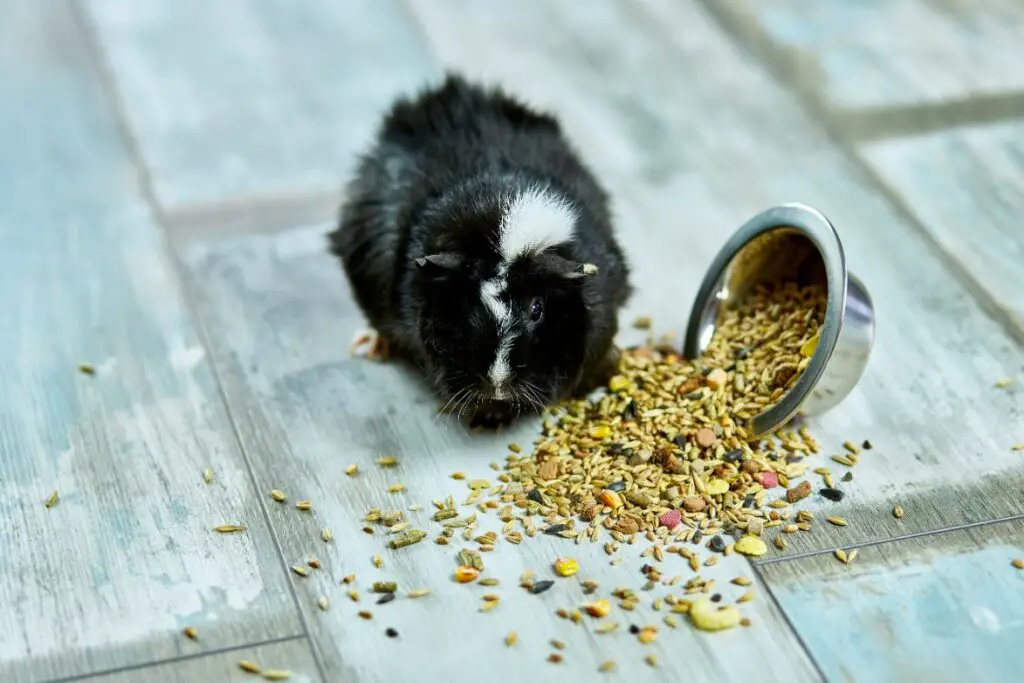Guinea pigs are adorable little creatures that make great pets. They are known for their cute squeaks and fluffy appearance, but they are also known for their insatiable appetite.
I have seen many pet owners worry about their guinea pig’s eating habits. People often wonder if their beloved pet is eating too much or perhaps not enough.
In this blog post, we will explore why guinea pigs eat so much, their nutritional needs, and how to control their eating.
Quick Explanation of Guinea Pig’s Dietary Needs
Guinea pigs are herbivores, which means they only eat plants. This diet consists of hay, fresh vegetables, pellets, and occasional treats.
They require a lot of fiber to maintain a healthy digestive system, which is why hay is an essential part of their diet. They also need vitamin C, which they cannot produce themselves, so they need to get it from their food.

Reasons Behind Your Guinea Pig’s Appetite:
Health-related Reasons for Increased Appetite
If your guinea pig suddenly starts eating more than usual, it could be a sign of an underlying issue. For instance, hormonal changes, such as pregnancy or illness, can increase your guinea pig’s appetite.
Behavioural Reasons for Overeating
Guinea pigs are creatures of habit, and they thrive on routine. If you change their feeding schedule or introduce new foods too quickly, it can lead to overeating.
Boredom is another reason why guinea pigs may overeat. If they do not have enough mental stimulation or exercise, they may turn to food for entertainment.
Age and Growth-related Reasons for Increased Food Intake
Young guinea pigs require more food than adults because they are still growing. Pregnant guinea pigs also need to eat more to support the growth of their babies.
However, as they get older, their food intake will decrease.
Nutritional Needs of Guinea Pigs
Understanding the Importance of Hay and Fresh Vegetables in a Guinea Pig’s Diet
Hay is an essential part of a guinea pig’s diet because it provides the fiber they need to maintain a healthy digestive system. Fresh vegetables, such as carrots and spinach, provide the essential vitamins and minerals they need to stay healthy.
Balancing the Diet with Pellets and Treats
Pellets are a convenient way to provide your guinea pig with the nutrients they need, but they should not be the sole source of their diet. Treats, such as fruits, should only be given in moderation because they are high in sugar.
Signs of Malnutrition and Overfeeding
If your guinea pig is not getting enough nutrients, it can lead to health problems such as hair loss and dental issues. Overfeeding can lead to obesity, which can also cause health problems such as diabetes and heart disease.
How to Control Your Guinea Pig’s Eating
Portion Control and Feeding Schedule
It is essential to monitor your guinea pig’s food intake and adjust their portion sizes accordingly. A feeding schedule can help establish a routine and prevent overeating.
Providing Mental Stimulation and Exercise to Curb Boredom Eating
Guinea pigs need mental stimulation and exercise to prevent boredom eating. Provide them with toys and a large enough cage to play in so they can stay active and entertained.
Preventing Obesity and the Associated Health Problems
Obesity is a common problem in guinea pigs, but it can be prevented. Limit their access to food, provide them with a balanced diet, and ensure they get enough exercise.
Conclusion
In conclusion, guinea pigs are adorable pets that require a balanced diet and portion control to maintain their health and wellbeing. Hay and fresh vegetables are essential, and pellets and treats should be given in moderation.
Monitor their food intake and provide them with mental stimulation and exercise to prevent boredom eating and obesity. By following these guidelines, you can ensure that your guinea pig lives a happy and healthy life.
- How Long Do American Eskimo Dogs Live? Important Factors and Care Tips - September 29, 2023
- Do American Bulldogs Need Grooming? Essential Tips and Care Guidelines - September 29, 2023
- Do Bengal Cats Enjoy Playing? Essential Tips for Keeping Them Active - September 29, 2023